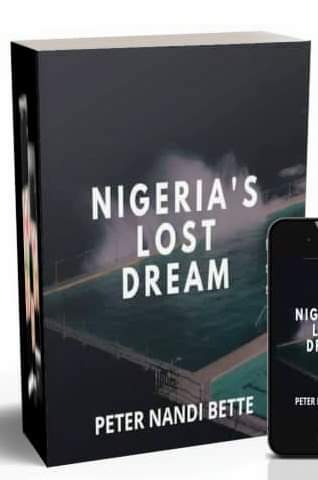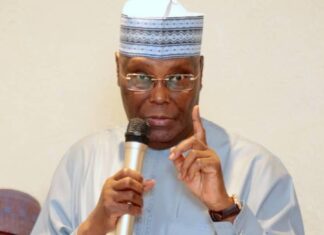BOOK REVIEW
Book Title: Nigeria’s Lost Dream
Author: Peter Nandi Bette
Year of Publication: 2021
Place of Publication: Columbia, USA
ISBN: 9798740739779
Pagination: 163
Chapters: 20
Reviewer: Florence Oluohu
If there was ever an iota of doubt as to how well Peter Nandi Bette knows Nigeria, the land of his birth, his Nigeria’s Lost Dream, a compendium of articles he had scripted over time, dispels such doubt effortlessly. The literary piece is a journey through time, seasons and governments. It is a searchlight beamed on policies and programmes of government through years of (mis)governance and a pillage of our collective commonwealth.
Taking his reader on a walk through the woods from 1960 when the nation attained independence from the colonial masters, Bette wades through the murky waters of nationhood, looking at Development Plans, Visions and Agenda of government and comes to a sad conclusion that “it is clear that Nigeria’s economic growth has been stifled by the lack of continuity in development programmes.” (P. 19)
____________________________________________________________________________________________________
READ ALSO:
My books, apprenticeship for what I’ll do – Helon Habila
Trade in second hand books spins success narratives
________________________________________________________________________________________________________
For a better understanding and appreciation of Bette’s book, a holistic appraisal would suffice, especially in view of the distinct but interrelatedness of the topical issues espoused in the chapters. But before then, we must acknowledge a former Director-General of the Institute for Peace Resolution in the Ministry of Foreign Affairs, Prof Oshita O.Oshita, for a Foreword to the book. He averred that “Anyone who is interested in governance in Nigeria and how experiences in the country could relate to those in other countries will surely find this book interesting and full of lessons.” (P.7)
In the same vein, veteran journalist and publisher, Unimke Nawa (now of blessed memory) who referred to the author as “Encyclopaedia Bettenandi” in the Preface to the book, said the book is “a collector’s item recommended to all choice scholars of the country’s political and economic development.”(P. 11)
Of the 20 chapters of Nigeria’s Lost Dream, 18 are 2014 articles, the 19th a 2015 publication, while the last is a Timeline of Historical Events from 1914 to1999. “Reviews on the Book” and “About the Author” are back matters that conclude it.
Chapters 1 and 2 – “Mr President, I beg To differ” and “Nigeria Is Negotiable” – are woven from the same thread. They reflect on the national conferences held in Nigeria; first, that of 1994 under the military administration of Gen Sani Abacha, and that of 2014 during the President Goodluck Ebele Jonathan civilian dispensation. To Bette, because the unity of Nigeria is sacrosanct, “it will be too dangerous not to discuss ‘National Unity’ at the confab when the Boko Haram insurgents and their bombs keep reminding us every day that we have to renegotiate Nigeria” (P. 27) and “If the unity of Nigeria is not negotiable, Nigeria herself is negotiable.” (P. 31)
“Of Talkative Civil Servants” (Chapter 3) sees the author taking a good natured swipe at the social media – WhatsApp, Twitter and, especially Facebook. With a case study, he concludes that it is a “drunken assembly” which should be devoid of “ethnic prejudices and biases.” (P. 32)
Without mincing words, Chapter 4, “Youths And Contemporary Nigerian History”, avers that “Those who are trying to kill the teaching and learning of History in our schools are on a mission to destroy the future of humanity” (P. 39) while the author, in the next chapter titled “Road To Kigali”, warned that the heating up of the polity in Nigeria, with reckless utterances by political actors on the top rungs of the ladder may spell disaster in the manner witnessed in war-torn Rwanda.
The well-being of Nigeria takes centre stage in Chapters 6, 7 and 8 – “Happy Democracy Day, Fellow Nigerians”; “No, We Will Not Die”; and “Beyond Religious Fanaticism” – where the author respectively celebrates the 15th anniversary of uninterrupted democracy, x-rays the issue of resource control, and bemoans religious fanaticism which he describes as “one of the greatest tragedies to befall mankind,” and “an epidemic that is gradually eating up the world.” (P. 68)
Chapter 9, from which the book takes its title, takes the reader on a journey of discovery – to where Nigeria lost it as a nation, and dovetails to finding a solution in Chapter 10, “Time to Return to the Drawing Board”.
For a student of History, Chapter 11 is quite instructive. Titled “The Ides of July”, it lists the woes that came with the 7th month, including the World War I of 1914, July 29, 1966 assassination in Nigeria that paved way for the civil war of July 1967, the July 1975 toppling of Gen Yakubu Gowon’s administration, and the July 2014 bomb blast in Kaduna.
Ebola, a health pandemic that ravaged the world, takes centre stage in Chapter 12, “Did He Come To Kill?” The question here is: Did Patrick Sawyer, the Liberian who “imported” Ebola into Nigeria deliberately come to spread the disease or to seek a cure?
In “What If He Were Alive”, the 13th chapter, the author intricately wove his plot, with copious references and imagery, wondering what would have been the fate of Nigeria and Nigerians if the country’s military ruler, Gen Sani Abacha, had not died when he did.

Peter Nandi Bette
“Diplomatic Baggage” is as enlightening as it is hilarious. It tells of a Nigerian politician, Alhaji Umaru Dikko, who was crated and ready to be shipped to Nigeria from London where he had relocated on exile when the administration of Alhaji Shehu Shagari, in which he served as Minister, was toppled in a military coup. The crate was tagged diplomatic baggage. Unfortunately for his “craters”, the plot failed!
While “Who Did It?” in chapter 15, asks the question that is still pertinent, and still unanswered, to date: Who killed Dele Giwa, a journalist, via a letter bomb in 1986?,
“Rumbling In The Desert” x-rays the many troubles of Burkina Faso, a West African country formerly called Upper Volta.
In “Aburi Federalism”, lovers of History will love the step-by-step account of events that led to what became widely known as the Aburi Accord. To Bette, “Victor Vester Prisoner” in Chapter 18 is a “mental excursion into the South African struggle” (P. 137), giving prominence to the symbol of the struggle, Nelson Mandela and his prison-to-presidency journey.
“The Vancouver man” starts off with youths bringing honour to the nation and zeroes in on the then 19-year-old undergraduate, Emmanuel Ifeajuna’s exploits at the British Empire and Commonwealth Games held in Vancouver in 1954.
Chapter 20 wraps it up with a “Timeline Of Historical Events” culled from www.ngex.com/default.htm.
On the plus side, Bette’s Nigeria’s Lost Dream is an honest appraisal of the Nigerian situation. The author displays commendable knowledge about the problems besetting the nation and projects it, with copious examples, analogies and facts. He is, indeed, generous with case studies and never leaves his readers hanging on a cliff. Solution journalism is his forte.
On the flip side, the book “enjoys” some mistakes that can be situated at the doorstep of omission. One of such is on Page 41, where reference was made to a 2012 Attorney General, a SAN, without mention made of his name. This should be corrected in subsequent editions. MOSOP was rendered as the Movement for the Survival of Ogoni (People) on Page 157.
However, these minor errors have not taken anything from the substance of Nigeria’s Lost Dream. Written in an easy-to-comprehend form, presented in an easy-to-read typeface and chapters, and packaged in an easy-to-carry form, it is a treasure trove that does not parade sentiments but presents facts as they are. It enables the reader decide what to read at any particular time.
Nigeria’s Lost Dream deserves a place on the bookshelf of every Nigerian household. But beyond adorning the shelves, it should be read for knowledge and history. The author indeed did justice to his subject matters.
*Florence Oluohu is Editor, Nigerian Chronicle Newspaper.













